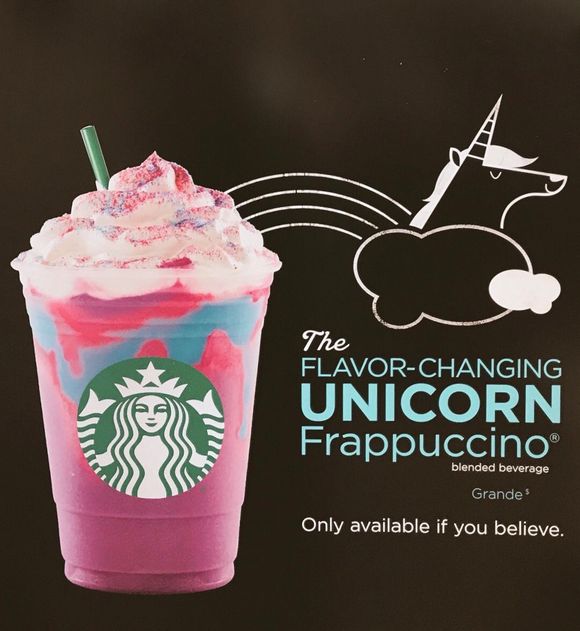Marketing the Unicorn
Starbucks did something pretty amazing this week. With 1 Facebook post, 1 Instagram post, and an a-frame sign at each store the international coffee giant was able to take it's normal daily sales and split it 50/50 between the rest of the menu and the Unicorn Frappuccino (source: our baristas at the Starbucks on Cedar Road).
 The beauty of what Starbucks has been able to do is brilliant!
The beauty of what Starbucks has been able to do is brilliant!
This drink, cleverly named after my fraternity's mascot, is a mix of zero nutritional value, sugar, fat, and fairy dust. This is a drink that is the equivalent to eating three Snickers candy bars in one sitting, and yet our local Starbucks has been a frenzy over the past 24-hours with patrons lining up to get their hands on the pink and blue unicorn goodness (or poison depending on how you look at it).
With little to no marketing, this drink was able to become a hashtag, commonly used phrase, and power player in the morning routine of the green mermaid's coffee arsenal (although the drink contains no coffee or caffeine).
A product that has no nutritional value, has received over 700k likes and shares on social media with little to no marketing presence. Be sure of this though, Starbucks has been very intentional about marketing this product.
What I find most interesting about this product is the timing. On the heals of Easter, in the first days of Eastertide, Starbucks has shown us how the "less is more marketing style works." Churches should spend 5% of it's bottom line to see 10% in growth according to UMC Communications. Yet often this is not a thought out or longterm plan.
Easter is a time during the year when churches put on the dog, planning marketing campaigns (or outsourcing them), staging multiple events throughout Holy Week, and fill more eggs than the Easter bunny. All of this is done to draw more people into the church, more new disciples, and to reconnect those who have left the church for one reason or another.
With Easter Sunday being the biggest Sunday of the year for most churches it makes sense that they would spare no expense when it comes to marketing for their events.

What if though, we learned something from Starbucks when it comes to our marketing. Be sure that Starbucks was very intentional when it comes to a marketing campaign, but their latest "secret-menu" item did not stay a secret for very long and that was intentional!
Churches have the responsibility for sharing, proclaiming, and spreading the greatest message and news of all time. More important than a blended beverage thats for sure, and yet it seems like often churches keep the Good News of Jesus Christ on the secret menu because of a failure to take marketing seriously.
With 1 Facebook post, 1 Instagram post, and an a-frame sign at each store the international coffee giant was able let the secret out of the bag. Are we overthinking marketing in our local churches? In our overthinking are we actually under-thinking?
